初中英语语法复习 代词情态动词总结及练习题
初中英语语法之情态动词用法及练习题(含答案)
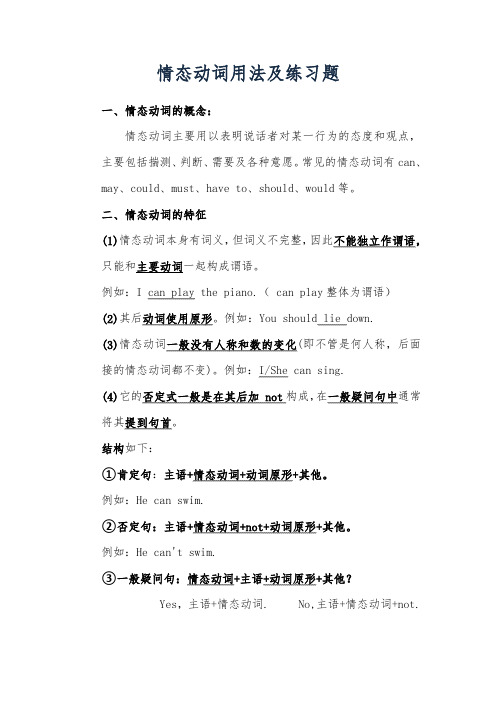
情态动词用法及练习题一、情态动词的概念:情态动词主要用以表明说话者对某一行为的态度和观点,主要包括揣测、判断、需要及各种意愿。
常见的情态动词有can、may、could、must、have to、should、would等。
二、情态动词的特征(1)情态动词本身有词义,但词义不完整,因此不能独立作谓语,只能和主要动词一起构成谓语。
例如:I can play the piano.( can play整体为谓语)(2)其后动词使用原形。
例如:You should lie down.(3)情态动词一般没有人称和数的变化(即不管是何人称,后面接的情态动词都不变)。
例如:I/She can sing.(4)它的否定式一般是在其后加 not构成,在一般疑问句中通常将其提到句首。
结构如下:①肯定句:主语+情态动词+动词原形+其他。
例如:He can swim.②否定句:主语+情态动词+not+动词原形+其他。
例如:He can't swim.③一般疑问句:情态动词+主语+动词原形+其他?Yes,主语+情态动词. No,主语+情态动词+not.例如:-Can he swim?-Yes, he can. No,he can’t.④特殊疑问句:特殊疑问词+情态动词+主语+动词原形+其他? 例如: -What can he do ?-He can swim.三.情态动词的用法(1)can的用法①表示“能力”Can you sing?你会唱歌吗?②表示客观条件允许You can listen to music here.你可以在这里听音乐。
You can’t park your car here. 你不能在此停车③can用在否定句和疑问句中时,有时表示说话人的怀疑、惊异、或猜测:It can’t be true.这不可能是事实Can it be true?这可能是真的吗?④.can的搭配用法:A.as +adj./adv.+as one can/could “尽可能,尽量……”,如:The man took his child to the hospital as quickly as he could.这个男人尽可能快地将孩子送去医院。
初中英语语法知识点总结及练习精选全文完整版
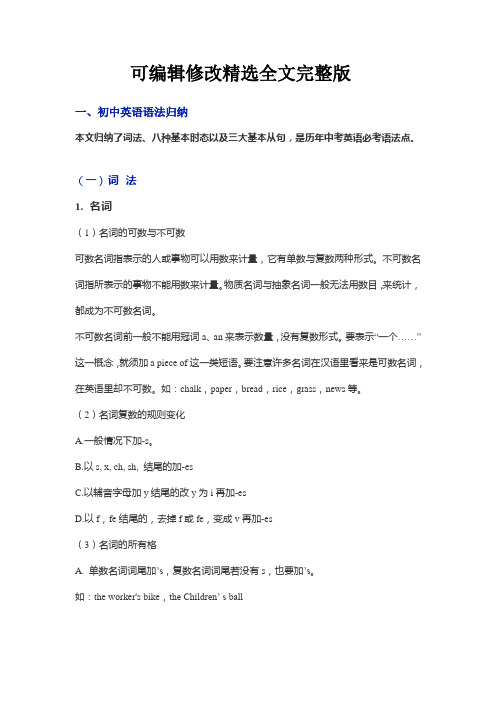
可编辑修改精选全文完整版一、初中英语语法归纳本文归纳了词法、八种基本时态以及三大基本从句,是历年中考英语必考语法点。
(一)词法1. 名词(1)名词的可数与不可数可数名词指表示的人或事物可以用数来计量,它有单数与复数两种形式。
不可数名词指所表示的事物不能用数来计量。
物质名词与抽象名词一般无法用数目,来统计,都成为不可数名词。
不可数名词前一般不能用冠词a、an来表示数量,没有复数形式。
要表示“一个……”这一概念,就须加a piece of这一类短语。
要注意许多名词在汉语里看来是可数名词,在英语里却不可数。
如:chalk,paper,bread,rice,grass,news等。
(2)名词复数的规则变化A.一般情况下加-s。
B.以s, x, ch, sh, 结尾的加-esC.以辅音字母加y结尾的改y为i再加-esD.以f,fe结尾的,去掉f或fe,变成v再加-es(3)名词的所有格A. 单数名词词尾加’s,复数名词词尾若没有s,也要加’s。
如:the worker's bike,the Children’ s ballB. 表示几个人共有一样东西,只需在最后一个人的名字后加’ s若表示各自所有,则需在各个名字后’ s。
如:This is Lucy and Licy’ s room.These are Kate's and jack’ s rooms.C. 如果是通过在词尾加—s构成的复数形式的名词,只加’。
如:the students’ books,the girls’ blouses(另外:名词+of+名词名词是有生命的,我们就用’s结构来表示所有关系。
如果名词所表示的事物是无生命的,我们就要用名词+of+名词的结构来表示所有关系。
) 2. 代词人称代词,物主代词,反身代词,指示代词,不定代词(1)人称代词第一人称单数I me my mine myself复数 we us our ours ourselves第二人称单数 you you your yours yourself复数 you you your yours yourselves第三人称单数 he him his his himselfshe her her hers herselfit it its its itself复数 they them their theirs themselves(2)物主代词物主代词的用法:形容词性物主代词后面一定要跟上一个名词;名词性物主代词可作主语、表语、宾语。
初中情态动词知识点及习题(附答案)
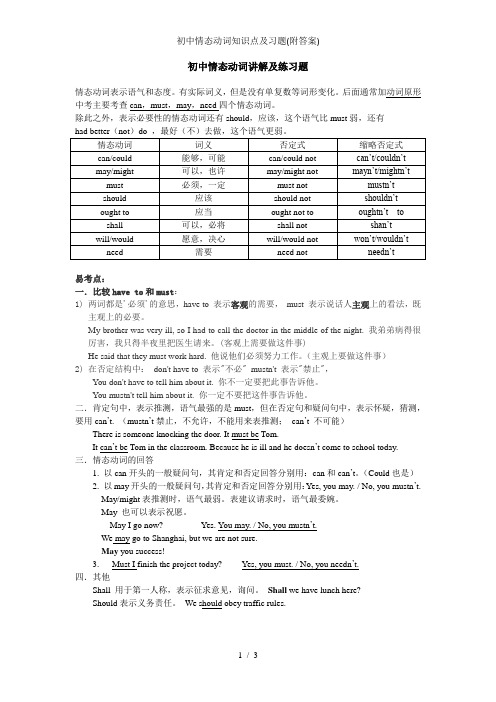
初中情态动词讲解及练习题情态动词表示语气和态度。
有实际词义,但是没有单复数等词形变化。
后面通常加动词原形中考主要考查can,must,may,need四个情态动词。
除此之外,表示必要性的情态动词还有should,应该,这个语气比must弱,还有易考点:一.比较have to和must:1) 两词都是'必须'的意思,have to表示客观的需要,must 表示说话人主观上的看法,既主观上的必要。
My brother was very ill, so I had to call the doctor in the middle of the night.我弟弟病得很厉害,我只得半夜里把医生请来。
(客观上需要做这件事)He said that they must work hard.他说他们必须努力工作。
(主观上要做这件事)2) 在否定结构中:don't have to 表示"不必" mustn't表示"禁止",You don't have to tell him about it. 你不一定要把此事告诉他。
You mustn't tell him about it. 你一定不要把这件事告诉他。
二.肯定句中,表示推测,语气最强的是must,但在否定句和疑问句中,表示怀疑,猜测,要用can’t. (mustn’t禁止,不允许,不能用来表推测;can’t 不可能)There is someone knocking the door. It must be Tom.It can’t be Tom in the classroom. Because he is ill and he doesn’t come to school today.三.情态动词的回答1. 以can开头的一般疑问句,其肯定和否定回答分别用:can和can’t。
初一英语情态动词练习题40题含答案解析
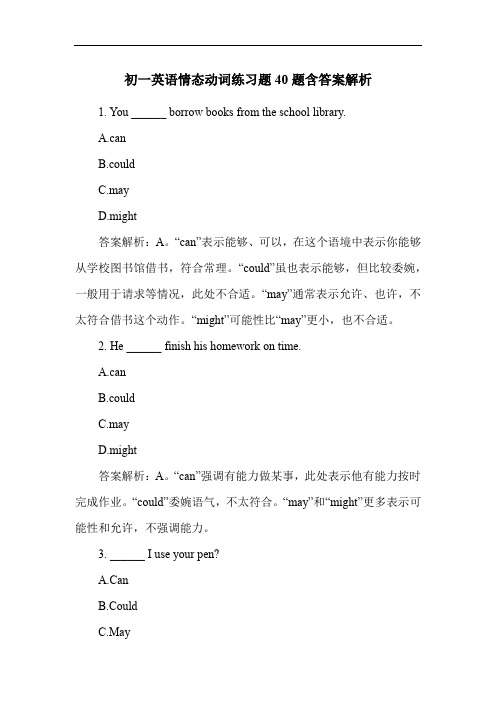
初一英语情态动词练习题40题含答案解析1. You ______ borrow books from the school library.A.canB.couldC.mayD.might答案解析:A。
“can”表示能够、可以,在这个语境中表示你能够从学校图书馆借书,符合常理。
“could”虽也表示能够,但比较委婉,一般用于请求等情况,此处不合适。
“may”通常表示允许、也许,不太符合借书这个动作。
“might”可能性比“may”更小,也不合适。
2. He ______ finish his homework on time.A.canB.couldC.mayD.might答案解析:A。
“can”强调有能力做某事,此处表示他有能力按时完成作业。
“could”委婉语气,不太符合。
“may”和“might”更多表示可能性和允许,不强调能力。
3. ______ I use your pen?A.CanB.CouldC.May答案解析:A 或C 都可以。
“Can I use your pen?”和“May I use your pen?”在请求别人允许时都可以用。
“could”和“might”语气更委婉,但不如“can”和“may”常用。
4. She ______ come to school early tomorrow.A.canB.couldC.mayD.might答案解析:C 或D。
“may”和“might”都表示可能性,此处表示她明天可能早点来学校。
“can”和“could”强调能力,不太符合语境。
5. We ______ listen to the teacher carefully in class.A.canB.couldC.mayD.might答案解析:A。
“can”表示能够、应该,在课堂上我们应该认真听老师讲课,符合语境。
“could”委婉语气,不太恰当。
“may”和“might”更多表示可能性和允许。
中考英语情态动词练习题50题含答案解析
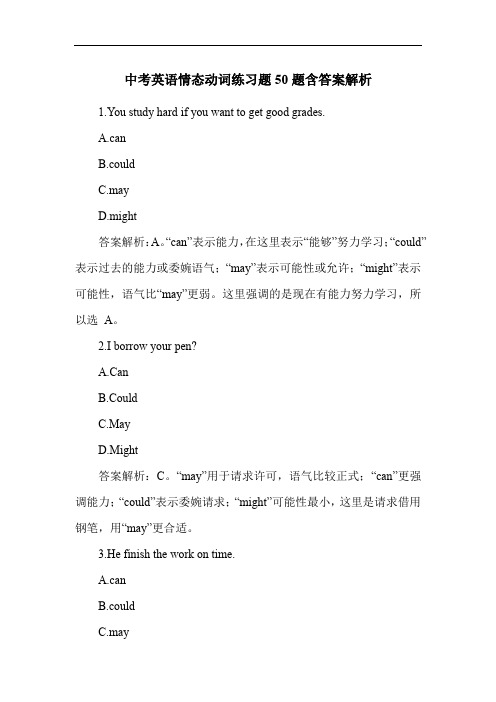
中考英语情态动词练习题50题含答案解析1.You study hard if you want to get good grades.A.canB.couldC.mayD.might答案解析:A。
“can”表示能力,在这里表示“能够”努力学习;“could”表示过去的能力或委婉语气;“may”表示可能性或允许;“might”表示可能性,语气比“may”更弱。
这里强调的是现在有能力努力学习,所以选A。
2.I borrow your pen?A.CanB.CouldC.MayD.Might答案解析:C。
“may”用于请求许可,语气比较正式;“can”更强调能力;“could”表示委婉请求;“might”可能性最小,这里是请求借用钢笔,用“may”更合适。
3.He finish the work on time.A.canB.couldC.may答案解析:A。
“can”表示能力,这里表示他有能力按时完成工作;“could”过去的能力或委婉语气;“may”表示可能性或允许;“might”可能性最小,这里强调能力,选A。
4. you help me with this problem?A.CanB.CouldC.MayD.Might答案解析:B。
“could”在这里表示委婉地请求帮助;“can”语气比较直接;“may”和“might”主要表示可能性和允许,不太符合语境。
5.She come to the party if she has time.A.canB.couldC.mayD.might答案解析:C。
“may”表示可能性,在这里表示她有可能来参加派对如果有时间;“can”表示能力;“could”过去的能力或委婉语气;“might”可能性比“may”更小。
6.We go to the park if it doesn't rain.A.canB.couldD.might答案解析:A。
“can”表示能够,这里表示如果不下雨我们能够去公园;“could”过去的能力或委婉语气;“may”表示可能性或允许;“might”可能性最小。
复习专题常见情态动词最全总结

复习专题常见情态动词最全总结一、初中英语情态动词1.——Do you have any plans for this summer vacation? ——I'm not sure. I ___ take a trip to Taiwan.A. mustB. needC. mayD. should【答案】C【解析】【分析】句意:一今天暑假你有什么计划吗?一我还不确定。
我可能去台湾去旅行。
A.必须,一定;B.需要,必要;C.可能;D.应该。
根据句中I'm not sure可知,说话人还没有确定的计划,所以这只是一个可能,应选C。
2.—Where is George?—He _______ be here just now. His coffee is still warm.A. needB. can'tC. mustD. shouldn't【答案】 C【解析】【分析】句意:——乔治在哪里?——他刚才一定在这里,他的咖啡还是热的。
A. need需要; B. can't 不能,不可能(表示推测); C. must 必须,一定(表示推测); D. shouldn't不应该;根据His coffee is still warm.可知表示肯定推测一定在这儿;故答案为C。
【点评】考查情态动词。
掌握情态动词表推测时的意义和用法。
3.— Sorry, I forgot to take money with me. Maybe I can't buy the book you like.— Mum, you ______ worry about it. We can pay by Alipay (支付宝).A. can'tB. needn'tC. mustn'tD. shouldn't【答案】 B【解析】【分析】句意:——对不起,我忘记带钱了。
初中英语语法情态动词讲解与练习有答案
情态动词在句中放在谓语动词之前,谓语动词前若有助动词,则在助动词之前,疑问句中,情态动词放在主语之前。
I can see you. Come here. 我能看见你,过来吧。
He must have been away. 他一定走了。
What can I do for you? 你要什么How dare you treat us like that! 你怎么敢那样对待我们!三.情态动词的特点情态动词无人称和数的变化,情态动词后面跟的动词需用原形,否定式构成是在情态动词后面加“not”。
个别情态动词有现在式和过去式两种形式,过去式可以用来表达更加客气、委婉的语气,时态性不强,可用于过去,现在或将来。
我们称之为“功能用法”。
He could be here soon. 他很快就来。
May I come in? 我可以进来吗?May I use your dictionary? 我可以用你的词典吗?You may put on more clothes. 你可以多穿点衣服。
He said he might lend us some money. 他说他可以借给我们一些钱。
may 否定式为 may not, 缩写形式是mayn’t。
might 是may 的过去式,有两种用法,一种表示过去式,一种表示虚拟语气,使语气更加委婉、客气或对可能性的怀疑。
He told me he might be here on time. 他说他能按时间来。
Might I borrow some money now? 我可以借点钱吗?He might be alive. 他可能还活着。
3. must “必须;应该;一定;准是”,表示说话人认为有必要做某事,命令、You needn't have taken it seriously. 这件事情你不必太认真。
5. dare “敢”,多用在否定或疑问句中。
The little girl dare not speak in public. 小女孩不敢在公众面前说话。
初中英语情态动词练习题及答案
初中英语情态动词练习题及答案第一篇:初中英语情态动词练习题及答案()1 John___ come to see us tonight, but he A.can'tB.canC.mustn'tD.A.I willB.I won'tC.leanD.I isn't very sure yet.mustmay—___ I take the newspaper away? A.mayB.canC.has toD.Must 2 You ___ be late for school again next time.—No, you mustn't.You____read it only here.They ___ do well in the exam.A.mustn'tB.needn'tA.Must;canB.May;canA.can be able toB.be able toC.don't have toD.don't need to C.Need;mustD.Must;mustC.can able toD.are able to 3 —Must I do my homework at once? —No, 1 Excuse me.___ you please pass me that cup? —May I take this book out? —No, you___.you___.A.needn'tB.mustn'tC.can'tA.DoB.ShouldC.WouldD.Must A.can'tB.may notC.needn'tD.aren'tYou___ go and see a doctor at once because you're got a fever.A.canB.mustC.dareD.would—Can you speak Japanese? —No, I____.A.mustn'tB.can'tC.needn'tD.may not 1.– He___ be in the classroom, I think —No, he ___ be in the classroom.I saw him go home a minute ago.A.can;may not B.must;may notC.may;can'tD.may;mustn't —Shall I get one more cake for you, Dad? —Thanks, but you___, I've had enough.A.may not B.must notC.can'tD.needn't Even the top students in our class can't work out this problem, so itbe very difficult.A.mayB.mustC.canD.need 4 He isn't at school.I think he ___ be ill.A.canB.shallC.mustD.has to 5 ___ I take this one?A.MayB.WillC.AreD.Do 1 The children___ play football on the road.D.may not His arm is all right.He___ go and see the doctor.A.has not toB.don't have toC.haven't toD.doesn't have toHe had to give up the plan, ___ he?A.didB.didn'tC.doesD.doesn't They had to walk here, ___ they?A.mustn'tB.didC.didn'tD.hadn't He had better stay here, ___ he?A.doesn'tB.don'tC.hadn'tD.isn't 2 You'd better___late next time.A.not to be B.not beC.won't beD.don't beYou'd better ___ your hair ___ once a month.A.had;cutB.had;cuttedC.have;cutD.have;cutted 4 You___ ask that man over there.Maybe he knows the way.A.had better not toB.had not betterC.had betterD.had better not 1 —Shall we go and visit the History Museum next Sunday? —________ A.Here you areB.Sorry, I can'tC.Yes, pleaseD.Let me try —Why don't you ask Mike to go with us? —Thanks, ___.___ you like to have another try?A.CouldB.WillC.WouldD.Do 3 —Would you like to go boating with us? —Yes, ___.A.I'd likeB.I wantC.I'd like toD.I do 1 You___ worry about your son.He willget well soon.A.needn'tB.can'tC.mustn'tD.have toThe poor man needs our help, ___ he?A.needB.needn'tC.doesD.doesn't —Must we do our homework first? —No, you___.You may have a rest first.A.mustn't B.needn't C.may not D.can't 1.I told Sally how to get here, but perhaps I _______ for her.A.had to write it out B.must have written it out C.should have written it outD.ought to write it out 2.—There were already five people in the car but they managed to take me as well.—It _______ a comfortable journey.A.can’t beB.shouldn’t beC.mustn’t have beenD.couldn’t have been 3.It’s nearly seven o’clock.Jack _______ be here at any moment.A.must B.NeedC.shouldD.can 4.Johnny, you _______ play with the knife, you _______ hurt yourself.A.won’t;can’tB.mustn’t;mayC.shouldn’t;mustD.can’t;shouldn’t 5.The fire spread through the hotel veryquickly but everyone _______ get out.A.had toB.wouldC.couldD.was able to6.—When can I come for the photos? I need them tomorrow afternoon.—They _______ be ready by 12:00.A.canB.shouldC.mightD.need7.—I stayed at a hotel while in New York.—Oh, did you? You _______ with Barbara.A.could have stayedB.could stayC.would stayD.must have stayed8.—Are you coming to Jeff’s party?—I’m not sure.I _______ go to the concert instead.A.mustB.wouldC.shouldD.might9.I was really anxious about you.You _______ home without a word.A.mustn’t leaveB.shouldn’t have leftC.couldn’t have leftD.needn’t leave10.—Is John coming by train?—He should, but he _______ not.He likes driving his car.A.mustB.canC.needD.may11.A left-luggage office is a place where bags _____ be left fora short time, especially at a railway station.A.should B.canC.mustD.will12.I wonder how he _______ that to the teacher.A.dare to sayB.dare sayingC.not dare sayD.dared say13.When he was there, he ___ go to that coffee shop at the corner after work every day.A.would B.shouldC.had betterD.might14.It has been announced that candidates _____ remain in their seats until all the papers have been collected.A.canB.willC.mayD.shall15.How ______ou say that you really understand the whole story if you have covered only a part of the article?A.canB.mustC.needD.may 16.—I hear you’ve got a set of valuable Australian coin._______ I have a look?—Yes, certainly.A.DoB.MayC.ShallD.Should 【巧学活用参考答案】1.1-5 A D A B B2.1-5 C D B C A3.1-3 C A A4.1-3 D B C5.1-4 C B C C6.1-3 B A B7.1-3 C C C8.1-3 A D B 情态动词练习参考答案1.C。
初中英语代词情态动词总结和练习题
初中英语代词情态动词总结和练习题.doc初中英语代词和情态动词总结和练习题一、引言代词和情态动词是英语学习中的基础内容,正确使用它们对于构建句子和表达意义至关重要。
本文档旨在总结初中英语中常见的代词和情态动词,并提供相应的练习题以加深理解。
二、代词总结人称代词主格人称代词:I, you, he, she, it, we, they宾格人称代词:me, you, him, her, it, us, them物主代词形容词性物主代词:my, your, his, her, its, our, their名词性物主代词:mine, yours, his, hers, its, ours, theirs 反身代词myself, yourself, himself, herself, itself, ourselves, themselves指示代词this, that, these, those疑问代词who, whom, whose, what, which不定代词some, any, no, every, each, every one, either, neither, both, many, much, little, a little, a lot, lots, a few, few三、情态动词总结can 和 could表示能力或请求许可。
may 和 might表示可能性或请求许可。
must表示必须或义务。
shall表示将来或提出建议。
should表示义务、责任或建议。
will 和 would表示将来或意愿。
need表示需要。
dare表示敢或不敢。
四、代词练习题填空题:使用适当的代词填空。
This is _______ (Tom) book. It's not ______ (I).选择题:选择正确的代词形式。
Whose book is this? It’s ______.A) meB) mineC) myD) I改错题:找出句子中的代词错误并改正。
人教版中考英语中考英语总复习情态动词X知识点总结及经典习题(含答案)
人教版中考英语中考英语总复习情态动词X知识点总结及经典习题(含答案)一、初中英语情态动词1.— We've ordered too much food. I eat any more.—Never mind. Let' take it home.A. can'tB. mustn'tC. needn'tD. shouldn't【答案】 A【解析】【分析】句意:——我们已经点了太多的食物,我不能再吃了。
——没关系,我们带回家吧。
can't不能;mustn't必须不;一定不要;needn't不必;shouldn't不应该。
根据句意可知选A。
【点评】考查情态动词辨析。
2.—Life is becoming convenient with the Internet.—That's true! Almost everything ______ be done online.A. mustB. couldC. shouldD. can't【答案】 B【解析】【分析】句意:——生活正随着网络变得方便。
——那是真的。
几乎所有的事情可以在网上完成。
A必须,B可以,C将,D不能。
根据 Life is becoming convenient with the Internet. 生活正随着网络变得方便,可知应该是很多事情可以在网上完成,故选B。
【点评】考查情态动词。
注意理解和掌握情态动词的不同用法。
3.Look at the sign! It says “No Smoking!” You ________ smoke here. It's dangerous.A. mustn'tB. ought not toC. needn'tD. don't have to【答案】 A【解析】【分析】句意:看这个标志!上面写道“禁止吸烟!“你不能抽烟。
- 1、下载文档前请自行甄别文档内容的完整性,平台不提供额外的编辑、内容补充、找答案等附加服务。
- 2、"仅部分预览"的文档,不可在线预览部分如存在完整性等问题,可反馈申请退款(可完整预览的文档不适用该条件!)。
- 3、如文档侵犯您的权益,请联系客服反馈,我们会尽快为您处理(人工客服工作时间:9:00-18:30)。
江西省吉安县凤凰中学初中英语语法复习代词情态动词总结及练习题意义情态动词(四)情态动词的基本用法1. can (could)1)表示能力,could主要指过去时间。
Two eyes can see more than one. 两只眼比一只眼看得清。
Could the girl read before she went to school? 这女孩上学前能识字吗?2)表示可能(理论上或是逻辑判断上)。
The temperature can fall to –60℃, that is 60℃ below freezing.气温可降至—60℃,也就是零下60℃。
He can’t (couldn’t) have enough money for a new car.他不可能有足够的钱买新车。
You mustn't smoke while you're walking around in the wood. You could start a fire.在林子里走时勿吸烟,那样可能会引起火灾。
3)表示允许。
Can I have a look at your new pen? 我可以看一看你的新钢笔吗?He asked whether he could take the book out of the reading-room.他问他可不可以把书带出阅览室。
4)表惊异、怀疑、不相信等态度。
主要用于否定句、疑问句或感叹句中。
Where can (could) they have gone to? 他们会去哪儿了呢?He can’t (couldn’t) be over sixty.他不可能超过六十岁。
How can you be so careless? 你怎么这么粗心?5)比较委婉客气地提出问题或陈述看法。
Can (Could) you lend me a hand? 帮我一把好吗?I’m afraid we couldn’t give you an answer today.恐怕我们今天不能给你答复。
2. may (might)1)表允许,might可以指过去时间,也可指现在时间,语气更委婉。
You may take whatever you like. 你喜欢什么就拿什么。
He told me that I might smoke in the room. 他告诉我可以在房间里抽烟。
May (Might) I ask for a photo of your baby? 我可以要一张你宝宝的照片吗?在回答以may引起的问句时,多避免用这个词,而用其它方式,如Yes, please. / Certainly. / Please don’t ./ You’d better not. / No, you mustn’t.等,以免显得太严峻或不客气。
2)表可能(事实上)。
可以指过去时间,也可以指现在时间,但语气更加不肯定。
He may be at home. 他可能在家。
She may not know about it. 她可能不知道这件事。
He was afraid they might not agree with him. 他担心他们可能不同意他的意见。
They might be having a meeting, but I’m not sure.他们有可能在开会,不过我不肯定。
3. must1)表示义务。
意为“必须”(主观意志)。
We must do everything step by step. 我们一切都必须循序渐进地做。
You mustn’t talk to her like that.你不可能那样对她说话。
--Must we hand in our exercise—books now? 我们现在就要交练习本吗?--No, you needn’t. / No, you don’t have to.不必。
(这种情况下,一般不用mustn’t)2)表示揣测。
意为“想必、准是、一定”等,只用于肯定句。
He must be ill. He looks so pale. 他准是病了。
他的脸色苍白。
She’s wearing a diamond necklace. She must have a lot of money.她戴着钻石项链,一定很有钱。
4. shall1)表征询意见,用于第一、第三人称疑问句。
Shall I get you some tea? 我给你点茶好吗?Shall the boy wait outside? 让那男孩在外面等吗?What shall we do this evening? 我们今晚做什么?2)表说话人的意愿,有“命令、允诺、警告、决心”等意思,用于第二、第三人称陈述句。
You shall do as I say. 按我说的做。
(命令)You shall have my answer tomorrow. 你明天可以得到我的答复。
(允诺)He shall be sorry for it one day, I tell you. 有一天他会后悔的,我告诉你。
(警告)Nothing shall stop us from carrying out the plan. 什么也不能阻止我们执行这项计划。
(决心)5. will1)表意愿,用于各种人称陈述句。
I will do anything for you. 我愿为你做任何事。
None is so blind as those who won’t see.不愿看的人眼最瞎。
If you will read the book, I’ll lend it to you.如果你愿意读这本书,我会把它借给你。
2)表请求,用于疑问句。
Will you close the window? It’s a bit cold.请你把窗户关上好吗?有点冷。
Won’t you drink some more coffee?再来一点咖啡好吗?3)表示某种倾向或习惯性动作。
Fish will die out of water. 鱼离开水就不能活。
The door won’t open.这门打不开。
The boy will sit there hour after hour looking at the traffic go by.那男孩常常坐在那里好几个钟点,看着车辆行人通过。
6. should1)表义务。
意为“应该”(某件事宜于做),用于各种人称。
You should be polite to your teachers. 你对老师应该有礼貌。
You shouldn’t waste any time.你不应该浪费时间。
2)表推测,意为“想必一定、照说应该、估计”等。
The film should be very good as it is starring first-class actors.这部新电影是一流演员主演的,估计拍得很好。
They should be home by now. 照说他们现在应当已经到家了。
7.would1)表意愿。
They would not let him in because he was poorly dressed. 他们不让他进去因为他衣着破旧。
I said I would do anything for you. 我说过我愿意为你做任何事。
2)表委婉地提出请求、建议或看法。
Would you like another glass of beer? 再来杯啤酒好吗?Would you mind cleaning the window? 请把窗户擦一下好吗?They wouldn’t have anything against it.他们不会有什么反对意见。
3)表过去反复发生的动作或过去的一种倾向。
Every time she was in trouble, she would go to him for help.她每遇到麻烦都会向她求助。
他告诉我盒子打不开了。
8. ought to1)表义务,意为“应该”(因责任、义务等该做),口气比should稍重。
You are his father. You ought to take care of him. 你是他父亲,应当管他。
You oughtn’t to smoke so much.你不应该抽这么多烟。
2)表推测,暗含很大的可能,语气较弱。
Han Mei ought to know his telephone number. 韩梅该知道他的电话号码。
There’s a fine sunset; it ought to be a fine day tomorrow. 今天有晚霞,明天应该是个好天。
9. used to表示过去的习惯动作或状态,现在不复发生或存在。
疑问式和否定式有两种。
He used to live in the countryside, but now he lives in the city.他过去住在乡下,现在住在城里。
There used to be a building at the street corn er, but it has been pulled down.街道拐角处过去有座楼房,现在拆了。
I usedn’t (didn’t use) to smoke.我过去不抽烟。
Used you (Did you use) to go to school on foot? 你过去常步行去学校吗?(一)need和dare的用法need和dare既可用作情态动词,也可用作实义动词。
用作情态动词时,主要用于否定句和疑问句。
用作实义动词时,可用于各种句式。
1.用作情态动词--Need I come? --Yes, you must. --我需要来吗?--需要。
You needn’t tele phone him now. 你现在不必打电话给他。
I don’t think you need worry.我想你不必发愁。
She dare not go out alone at night. 她晚上不敢一个人出去。
How dare you say I’m unfair?你竟敢说我不公平?Not one of them dared mention this. 他们谁也不敢提这件事。
2.用作实义动词You don’t nee d to do it yourself. 你不必亲自做这件事。
We need to tell th em the news. 我们需要把这消息告诉他们。
The table needs painting (to be painted.). 桌子需要油漆一下。
